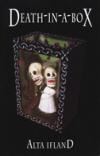Death-In-A-Box
“We are nothing but characters in a book” surmises the child narrator forever staring into the window of “Mrs. Q.’s Drugstore.” It is left to the reader to determine the exact relationship among the trio of peepers and if they ever work up the courage to see those “things that she must have at the counter.” But by the end of Death-In-A-Box readers will have a very good idea of Alta Ifland’s writing talent.
“We are nothing but characters in a book” surmises the child narrator forever staring into the window of “Mrs. Q.’s Drugstore.” It is left to the reader to determine the exact relationship among the trio of peepers and if they ever work up the courage to see those “things that she must have at the counter.” But by the end of Death-In-A-Box readers will have a very good idea of Alta Ifland’s writing talent.
As an anthology Death-In-A-Box is refreshingly hard to pinpoint. Some pieces, such as the title work, are miniature horror stories. Others are short essays or autobiographical sketches. What makes Death-In-A-Box a bit more than a graduate school portfolio (the book was published as the result of being awarded the 2010 Competition for Fiction sponsored by the University of Colorado at Boulder’s Creative Writing Program) is how imaginatively Ifland incorporates her Romanian émigré background into her writing.
The first way she accomplishes this is by creating a sense of isolation. The three children afraid to enter the drugstore are never apart but “spend most of the time at the window, watching the world outside.” This brings to mind images of the thousands of physically and mentally abused and abandoned orphans that international media outlets exposed in the violent aftermath of Romanian dictator Nikolai Ceausescu’s downfall in 1989.
A sense of belonging neither here nor there empowers the author. In the powerful “False Memories Of Not Myself”—a piece of memoir writing that will assist younger generations of readers and writers in understanding what life in a Soviet satellite state was like—Ifland recalls returning to America from a trip and realizing
that my only possession, besides my body, was the luggage I had with me…It was as if I didn’t exist—if one could say that. It wasn’t a painful realization, on the contrary, it came as a lightness overcoming the darkness and heaviness of being. If the plane had exploded, we would have dissolved into thin air and disappeared without a trace…Often, when I walk around and do things, I am nothing but pure-impure air. And something inside me keeps muttering, “not-a-soul-not-a-soul.”
Ifland is able to laugh at her immigrant status, as she does in “The Garbage Woman” when adding extra ingredients to the phrase, “That takes the cherry off the cake!” More seriously, a western observer might be labeled culturally insensitive for making this welcome, all-too unspoken observation in “False Memories Of Not Myself” regarding the universal characteristics of narcissism:
Those who “resist” under dictatorships are those whose only power is that of silencing their survival instinct, those for whom career and honors, that is, the recognition of one’s ego, mean nothing or not enough, or those who are on the edge of society and have nothing to lose. Each time I find myself before someone who displays great pride in the big leather armchair she is sitting in, I wonder what they would have done in other circumstances, another country, another time.
Other memories of her homeland are more truthful and non-pleasant. The strong narrative of “False Memories Of Not Myself” contains sinister fairy tale characters who are real:
They were nice people, especially the women, who were always eager to lend you a bit of sugar and flour, depending on the circumstances, or even money, who would take care of your progeny almost with a maternal tenderness while you were at work, and who, with the same undiminished ardor, would write anonymous letters to the neighborhood police to inform the authorities that you were a traitor and a spy. Not that they like to write, no. In fact, for the most part they were illiterate. But they wanted to participate in the life of the community, and what ties to community together better than lying and denouncing?
Another way Ifland keeps her writing original is by relishing her literary ancestral ties to Dracula without adding another vampire tale to an already bulging canon. “Fried Brains” is a gory parable of the final years of the Ceausescu regime. Her plot and word play on the idiomatic Romanian expression “Fried patience,” which translates as “nothing to eat,” is too good to reveal. In “Twin Sisters” Alta meets Alda, her new neighbor who may or may not be her dead twin reincarnated. In a twist on the vampire legend, Alda sleeps all day, not because she is under a spell but because she
hates reality. She thinks that the real is a prison for people with no imagination. So each afternoon I give her a medicine that puts her into a deep sleep. It is a sleep like death—or so she told me, because I never tried it—and each time, she wakes from it with a sense that life has just started.
This parallel universe, along with those of fact, fiction, or a combination of both, is what makes Death-In-A-Box a wild journey.





